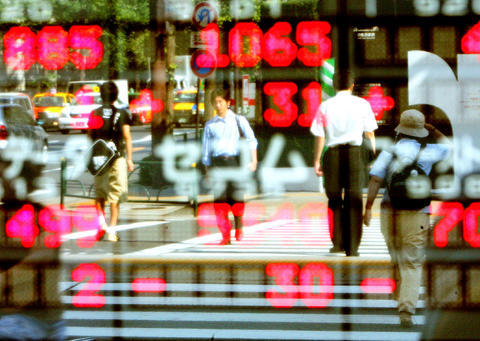Japan's and Australia's central banks injected more funds into money markets yesterday, continuing a string of such injections meant to ensure market liquidity and calm investors' fears in the wake of the US subprime mortgage crisis.
The Japanese central bank pumped ¥800 billion (US$7 billion) into money markets yesterday in its ongoing effort to curb rises in key interest rates in the face of US credit concerns. The Bank of Japan (BOJ) injected ¥1 trillion on Monday.
Major central banks, including the BOJ, as well as the US Federal Reserve and the European Central Bank, have already poured billions of dollars into the markets in recent weeks because of concerns about the possible impact of the US subprime mortgage woes' on the global economy.

PHOTO: AFP
The Japanese finance minister said he spoke by telephone with US Treasury Secretary Henry Paulson to work together closely to monitor the recent financial market turmoil.
"We've agreed that we will exchange opinions on a frequent basis, such as through telephone calls, and will closely monitor market conditions," Finance Minister Koji Omi told reporters.
The Reserve Bank of Australia also said it had injected A$3.57 billion (US$4.4 billion) yesterday through the purchase of mostly short-term securities, following a similar action on Monday.
The US Federal Reserve on Friday cut its key discount rate by half a percentage point to 5.75 percent to quell investor worries, though the action is considered a temporary remedy.
Global stock markets have mostly climbed since the rate cut, although after sharp gains on Friday in the US and Europe and on Monday in Asia, the pace has slowed.
The Dow Jones industrial average rose 0.32 percent on Monday in the US, after posting an 1.8 percent gain on Friday.
The Nikkei 225 benchmark stock index rose 168.86 points, or 1.07 percent, to close at 15,901.34 points on the Tokyo Stock Exchange yesterday. The index surged 458.8 points, or 3 percent, on Monday, posting the largest one-day point gain since June 22 last year.
Before the subprime mortgage crisis surfaced, analysts had expected the Bank of Japan to raise interest rates when it meets later this week. However, such expectations have dwindled at a time when financial authorities around the world are trying to work together to calm investors' jitters.
Omi urged the central bank to look at "the overall situation" before making a decision at the two-day monetary policy meeting scheduled to end tomorrow in what appears to be a signal from the government against a premature hike.
"I think it will make an appropriate judgment while looking at the overall situation," Omi said.

DAREDEVIL: Honnold said it had always been a dream of his to climb Taipei 101, while a Netflix producer said the skyscraper was ‘a real icon of this country’ US climber Alex Honnold yesterday took on Taiwan’s tallest building, becoming the first person to scale Taipei 101 without a rope, harness or safety net. Hundreds of spectators gathered at the base of the 101-story skyscraper to watch Honnold, 40, embark on his daredevil feat, which was also broadcast live on Netflix. Dressed in a red T-shirt and yellow custom-made climbing shoes, Honnold swiftly moved up the southeast face of the glass and steel building. At one point, he stepped onto a platform midway up to wave down at fans and onlookers who were taking photos. People watching from inside

A Vietnamese migrant worker yesterday won NT$12 million (US$379,627) on a Lunar New Year scratch card in Kaohsiung as part of Taiwan Lottery Co’s (台灣彩券) “NT$12 Million Grand Fortune” (1200萬大吉利) game. The man was the first top-prize winner of the new game launched on Jan. 6 to mark the Lunar New Year. Three Vietnamese migrant workers visited a Taiwan Lottery shop on Xinyue Street in Kaohsiung’s Gangshan District (崗山), a store representative said. The player bought multiple tickets and, after winning nothing, held the final lottery ticket in one hand and rubbed the store’s statue of the Maitreya Buddha’s belly with the other,

‘NATO-PLUS’: ‘Our strategic partners in the Indo-Pacific are facing increasing aggression by the Chinese Communist Party,’ US Representative Rob Wittman said The US House of Representatives on Monday released its version of the Consolidated Appropriations Act, which includes US$1.15 billion to support security cooperation with Taiwan. The omnibus act, covering US$1.2 trillion of spending, allocates US$1 billion for the Taiwan Security Cooperation Initiative, as well as US$150 million for the replacement of defense articles and reimbursement of defense services provided to Taiwan. The fund allocations were based on the US National Defense Authorization Act for fiscal 2026 that was passed by the US Congress last month and authorized up to US$1 billion to the US Defense Security Cooperation Agency in support of the

HIGH-TECH DEAL: Chipmakers that expand in the US would be able to import up to 2.5 times their new capacity with no extra tariffs during an approved construction period Taiwan aims to build a “democratic” high-tech supply chain with the US and form a strategic artificial intelligence (AI) partnership under the new tariffs deal it sealed with Washington last week, Taipei’s top negotiator in the talks said yesterday. US President Donald Trump has pushed Taiwan, a major producer of semiconductors which runs a large trade surplus with the US, to invest more in the US, specifically in chips that power AI. Under the terms of the long-negotiated deal, chipmakers such as Taiwan Semiconductor Manufacturing Co (TSMC, 台積電) that expand US production would incur a lower tariff on semiconductors or related manufacturing